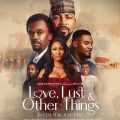By: Emmanuel Alonge
A second review of the Yoruba epic (First review)
Note: One MAJOR Spoiler ahead.
Deliciously flamboyant, Jagun Jagun is a cultural spectacle designed to impress with stunning visuals from start to finish. But it might leave you feeling like it didn’t make good on some of its promises.
Written by Femi Adebayo and co-directed by Tope Adebayo and Adebayo Tijani, Jagun Jagun is Nollywood’s latest Yoruba epic movie. It follows the intertwined lives of a brutal warlord for hire Ogundiji (Femi Adebayo) and a fledgling warrior Gbotija (Lateef Adedimeji) who enrols in the former’s School of Warriors in the hopes of becoming strong enough to someday avenge the massacre of his village and father’s death.
While Gbotija seeks only power for his mission, he also finds love and earns the admiration of his peers because of his courage and combat skills, and as a result, finds himself in the cross hairs of the jealous Ogundiji who feels unreasonably threatened by the rising star —a bit like the biblical Saul vs David story. Like Saul, Ogundiji’s jealousy consumes him and a mission to put down Gbotija displaces his main hustle — mass murder for power-grabbing monarchs. What follows are several attempts to kill Gbotija which culminate in an epic final showdown.
Odunlade Adekola’s cameo as Jigan at the start of the movie sets the tone. Right off the bat, you get a sense that you’re in for a ride through a world of shocking violence and gruesome killings with political undertones. And that’s what the movie delivers.
Throughout the movie, you will constantly oscillate between intrigue and horror, hope and heartbreak, scarcely interspersed by mild amusement. A cute love story develops but all that will likely get out of you are stifled cheers because even that doesn’t escape the massive ominous cloud that hangs over everything in sight.
Providing much of the intrigue and thrill are the cultural elements on display. They serve as one of the key pillars that prop up the film and prevent it from falling flat. The dialogue is brightly coloured with Yoruba proverbs and figurative expressions. From the showy and peculiar war regalia to the simple but elegant ìró and bùbá (women’s wrapper and top) and bùbá and sòkòtò (men’s top and trousers), the costumes are also very well put together.
The extra layer of gloss comes from the long list of big-name actors involved. Apart from the earlier mentioned Femi Adebayo, Odunlade Adekola, and Lateef Adedimeji, you also have A-listers such as Fathia Balogun, Adebayo Salami, Yinka Quadri, Peju Ogunmola, Dele Odule, Muyiwa Ademola, Bimbo Ademoye, and Ibrahim Chatta playing a part. While many only have minor roles with limited screen time, their presence gives the movie the feel of a genuine Yoruba Nolly production that sparks nostalgia.
Could the casting director have found a better actor to play the part of Gbotija than Lateef Adedimeji? Unlikely. The versatile actor’s ability to communicate intense emotions in the most compelling ways has always been impressive, with his portrayal of explosive rage, intimidating fierceness and heart-rending agony being the trick many would pay the most money to see any day. Luckily, he demonstrates all three multiple times with his trademark vim.
Adedimeji sells his character to us with precision. You’ll find him assured yet unassuming, teachable, yet committed to certain convictions — traits you’d expect to see in a young warrior seeking to someday avenge the massacre of his village. He crowns it all with a perpetually melancholic disposition fitting for a man with a tragedy-laden past, a murder-filled present and a darkness-ridden future. You’d most likely come away from the movie feeling like sending a truckload of flowers his way.
Like Adedimeji, Femi Adebayo, who plays Ogundiji, also rises to the occasion with a fierce performance reminiscent of the showings of the Yoruba epic movie warriors of old such as “Fadeyi Oloro” and “Abija.” Adebayo’s stellar acting including his impressive depiction of arrogance, brutality and callousness and thoughtfully-curated appearance featuring regal costumes, feature-darkening make-up, caveman-like facial hair and scraggly locs hanging from a partly shaved head combine brilliantly to present him as spooky and intimidating.
Bukunmi Oluwashina who stars as Iroyinogunkitan impressively switches from the fire-breathing heiress of Ogundiji to the smitten young woman that falls head over heels in love with the prodigy warrior, Gbotija. Kitan’s “lover girl” tenderness looks even more impressive when considered alongside an interesting revelation that pops up later in the movie.
Even with their bit-part roles, other big-name actors do not disappoint. Honorary mentions include the forever stunning Madame Fathia Balogun who plays Erinfunto, Ogundiji’s wife, as she expertly executes her role as matriarch and dutiful wife. Bimbo Ademoye, Muyiwa Ademola, Adebayo Salami, Dele Odule and Peju Ogunmola also deserve a shout.
You might come for the star-studded ensemble, but you’ll likely stay for the well-choreographed and gory fight sequences. The special effects are intense and vivid enough to make you shudder and wince if you appreciate relevant gory sequences and moments but do not particularly have a keen appetite for them. The moment where Moyale (Debo Adedayo aka Mr. Macaroni) viciously slashes the neck of a supposed assassin is burned into my memory; the swishing sound of the sword as it slices across flesh, drawing blood that follows the motion of the blade through the air and leaving a blood-spurting fatal gash on the unlucky man’s neck — spine-tingling.
But all the brilliant fight sequences, glamour and special effects do not hide the failings of an underwhelming story. Armed with an arsenal brimming with top talent and props, topped off by a brilliant location that gives the film just the right local and cultural feel, the movie could have offered a storyline with more depth, but that’s not what you get. Instead, you are left to wade through a slightly tedious production that’s more focused on thrilling through impressive visuals than a gripping plot.
For instance, (Spoiler Alert) Gbotija’s reaction to Gbogunmi’s death suggests the existence of a relationship deeper than we are led to believe. As such, the latter’s death should pack quite the punch and tug violently at our heartstrings but it falls short because of poor build-up. More time could have been spent highlighting the close-knit relationship between Gbotija and Gbogunmi to get us invested.
But in place of vital story-enhancing efforts like that, you have scenes like the one with a drawn-out narration layered over shots of Ogundiji’s school of warriors and the drills and rituals that take place there. While it serves as a fitting way to further help the viewers to grasp the gruelling and sometimes fatal activities that go on within the walls of the academy of violence, it could have been shorter, particularly since other aspects of the plot could have used more flesh.
A particular key motive stays buried for far too long. Gbotija’s primal motive for joining the school of warriors isn’t clear until he shares his backstory with Gbogunmi after over an hour of run time.
Thankfully, the little hitches in the plot do not distract from some of the story’s thought-provoking themes. Front and center is a strong message on the despicable lengths that intense and untamed emotions and desires can push people to. From jealousy to greed, the thirst for power to the longing for revenge, our unsavoury predilections remain the biggest causes of pain and suffering in the world.
All in all, Femi Adebayo who wears the hats of writer, producer and executive producer for this project has made a statement. Jagun Jagun screams ambition, purpose and a dedication to centering Yoruba culture as excellently as possible. Not bad at all.





